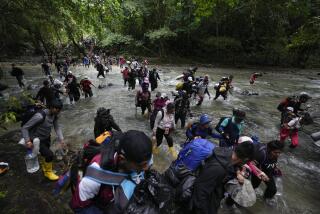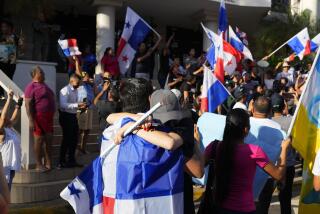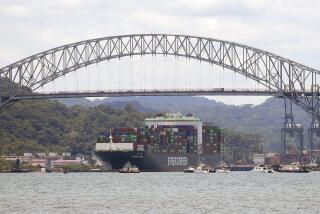Panama Is Torn Between Two Tigers
COLON, Panama — Beneath a larger-than-life poster proclaiming the friendship between their lands, Panamanian President Ernesto Perez Balladares and Taiwanese President Lee Teng-hui last month inaugurated a keystone of this country’s economic future.
They cut the ribbon for Davis industrial park, the biggest industrial investment so far on the former U.S. military bases being returned to Panama under the terms of a 1977 canal treaty. Eight Taiwanese companies have set up export factories here in a crucial vote of confidence for Panama’s efforts to turn the old bases into thriving, job-producing manufacturing centers. The $25-million investment is expected to grow to $90 million in five years.
Still, even that project is overshadowed by the $150 million or more that Panamanian authorities said Hutchison Whampoa plans to invest during the same period in Panama’s two most important ports. The Hong Kong conglomerate also will pay Panama $22.2 million a year for 25 years for the concession to run the ports, turned over to Panama under the same treaty as the bases.
Apparently, the Hong Kong and Taiwan investments are complementary parts of building Panama’s future after the United States completes its gradual pullout from the canal in 1999. But they represent conflicting interests: The former British colony of Hong Kong on July 1 was returned to China, which regards Taiwan as a renegade province. And the importance of that change half a world away from Panama became clear last month when China, for the first time, used Hong Kong’s economic clout to punish a nation for its ties to Taiwan.
The message is that Panama and the 29 other mainly small, poor nations that still give Taiwan diplomatic recognition may soon be forced to choose between two of Asia’s most dynamic economies for much-needed investment and aid. As a result, what has been a diplomatic shuffle could have dire consequences for weak economies desperate to find an entry into the world economy.
Until now, China has used its prominence in international organizations to penalize nations that still maintain diplomatic relations with Taiwan, the island that became a haven for the losing side in China’s 1949 civil war.
Beijing used its influence within the United Nations to force the organization to scale back peacekeeping missions in Haiti and Guatemala because of those countries’ ties to Taiwan. Similarly, when Panama invited Lee to last month’s Universal Congress on the Future of the Panama Canal, which Taiwan helped fund by donating $800,000, China pressured other heads of state not to attend.
The result was an embarrassment for Panama, which had expected to host a high-level international forum. Except for Lee, only two presidents, both from Central America, shared the dais with Perez Balladares.
But the Chinese apparently decided that embarrassment was not enough. A Chinese Foreign Ministry spokesman said recently in Beijing that the invitation to Lee will have “inevitable consequences” on the function of Panama’s Hong Kong Trade Office. The office is the remnant of the consulate that Panama had to close when the Chinese took control of Hong Kong. The Panamanians have permission to operate the office through February.
Panamanian officials privately worry that the next step may be closing the port of Hong Kong to ships with Panamanian registry--a blow for the Central American nation, which has the world’s second-largest merchant fleet.
Lee told Panama’s Congress that, “if the Panama Canal or the economy of this nation is affected for having taken this fair and courageous position, I believe the nations of the world, especially [Taiwan], should cooperate as much as possible with Panama.”
Economic cooperation has been key to Taiwan’s ability to keep its allies, mainly small, poor Latin American and African nations. Taiwan recently has funded a trade office in its capital, Taipei, for Panama’s neighbors and pledged $200 million to create an “economic cooperation” fund to strengthen bilateral ties and increase trade with the five Central American nations, which now totals about $260 million a year.
Guatemala, Honduras, El Salvador, Nicaragua and Costa Rica all have diplomatic relations with Taipei and have supported a proposal to admit Taiwan to the United Nations.
In contrast, when Taiwan learned earlier this year that the Bahamas planned to establish diplomatic relations with Beijing, it immediately cut off all aid to the Caribbean nation and closed its embassy there.
Until taking over Hong Kong, China was hard-pressed to respond to Taiwan’s economic overtures to its allies.
Panamanian Vice President Tomas Altamirano Duque recently dismissed China’s threats, saying Beijing “has not given us much help.”
But with Hong Kong, China is in a better position to give--or withhold--support. And Panama is a likely proving ground for the Asian powers to test their economic weapons.
Panama ranks fifth among Taiwan’s investment destinations--far ahead of any other Latin American country. Since 1995, Taiwan’s new investment in Panama has risen steadily, from $15 million to $64 million last year and $68 million in the first six months of this year.
While that investment is made by private companies, it is all subject to the approval of Taiwan’s government.
The importance of Hong Kong’s economic relations with Panama are evident in trade figures, even though investment statistics are not available. Panama is Hong Kong’s port of entry into Latin America, accounting for 35% of exports to the region. Most of the $501 million in merchandise that Hong Kong exports to Panama enters through the Colon free-trade zone for reexport.
Panama now can ill-afford to lose either China or Taiwan as economic partners.
This country slightly larger than West Virginia is less than 2 1/2 years away from taking full control of the Panama Canal, a vital but congested waterway that will need at least $900 million in modernization, its administrators say.
Panama also needs investment to develop the 500 square miles of land and ports that were once the U.S.-controlled canal zone.
As Perez Balladares noted in his speech inaugurating the three-day meeting on the canal’s future, “Panama does not have the domestic savings to pay for the investments needed.” Indeed, investments of that size may well require all the support that Panama can get.
Still, as China’s pressure and Taiwan’s defiance both rise, Panama may be forced to choose between the two. And the factors that affect that choice could influence whether this country’s neighbors in Central America--one of the few regions where Taiwan holds diplomatic sway--ultimately switch alliances.
(BEGIN TEXT OF INFOBOX / INFOGRAPHIC)
Ties to Taiwan
With U.S. military bases clearing out of the Panama Canal region in accordance with a 1977 treaty, Panama’s economic future is dependent on foreign investments such as major projects being initiated by Hong Kong and Taiwan. But China, which now controls Hong Kong, is pressuring Panama and other small, mostly poor nations with diplomatic ties to Taiwan--which Beijing considers a renegade province--to sever those ties. This would result in the loss of much-needed investment and economic aid.
China
President: Jiang Zemin
Population: 1.2 billion
Area: 3.69 million square miles
Gross domestic product: $2.61 trillion
*
Taiwan
President: Lee Teng-hui
Population: 21.5 million
Area: 13,969 square miles
Gross domestic product: $257 billion
****
Regional Relations
Central American and Caribbean nations with diplomatic ties to Taiwan:
Belize
Costa Rica
Dominica
The Dominican Republic
El Salvador
Grenada
Guatemala
Haiti
Honduras
Nicaragua
Panama
Paraguay
St. Kitts and Nevis
St. Lucia
St. Vincent and the Grenadines
Sources: The World Almanac and Book of Facts 1997, Times staff reports
More to Read
Sign up for Essential California
The most important California stories and recommendations in your inbox every morning.
You may occasionally receive promotional content from the Los Angeles Times.










